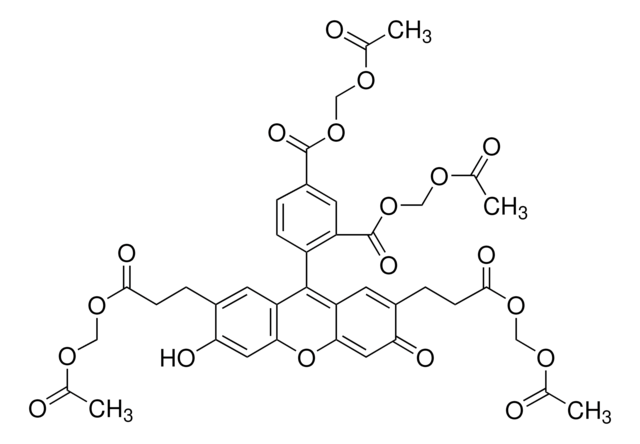46123
1-(Ethoxycarbonylmethyl)-6-methoxyquinolinium bromide
suitable for fluorescence, ≥97.0% (TLC)
Synonym(s):
(6-Methoxyquinolinio)acetic acid ethyl ester bromide, MQAE
About This Item
Recommended Products
Quality Level
Assay
≥97.0% (TLC)
form
solid
mp
177-179 °C (lit.)
solubility
DMSO: soluble
H2O: soluble
methanol: soluble
fluorescence
λex 350 nm; λem 460 nm in 0.1 M borate pH 8.0 (quenching with Cl-)
suitability
suitable for fluorescence
storage temp.
2-8°C
SMILES string
[Br-].CCOC(=O)C[n+]1cccc2cc(OC)ccc12
InChI
1S/C14H16NO3.BrH/c1-3-18-14(16)10-15-8-4-5-11-9-12(17-2)6-7-13(11)15;/h4-9H,3,10H2,1-2H3;1H/q+1;/p-1
InChI key
DSLLHVISNOIYHR-UHFFFAOYSA-M
Looking for similar products? Visit Product Comparison Guide
Application
Other Notes
Signal Word
Warning
Hazard Statements
Precautionary Statements
Hazard Classifications
Eye Irrit. 2 - Skin Irrit. 2 - STOT SE 3
Target Organs
Respiratory system
Storage Class Code
11 - Combustible Solids
WGK
WGK 3
Flash Point(F)
Not applicable
Flash Point(C)
Not applicable
Personal Protective Equipment
Choose from one of the most recent versions:
Already Own This Product?
Find documentation for the products that you have recently purchased in the Document Library.
Our team of scientists has experience in all areas of research including Life Science, Material Science, Chemical Synthesis, Chromatography, Analytical and many others.
Contact Technical Service







